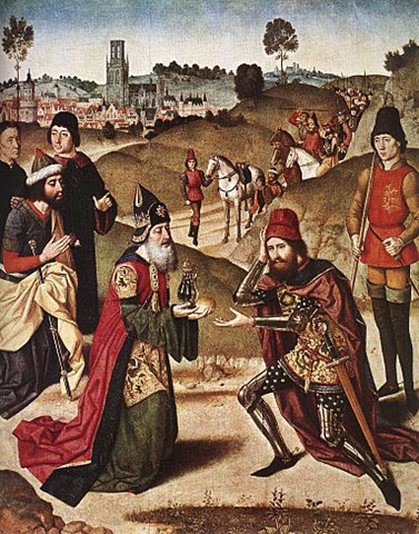The Lists of Hebrews
A Study of the book of Hebrews
Lesson 3
Hebrews 7-8
In the Lesson 2, 6 Ways Christ is Better, we briefly noted that Christ was better than the Levites. This was a direct hit on the reader’s thinking since they were either actively returning to Judaism or at least strongly considering it.
The writer confronts them in Hebrews 7 with a full discussion comparing Christ, Melchizedek, a great high priest and the Levites, the Jewish priests. After he makes his arguments, any reader that wanted to be a true son of Abraham had to stop and think seriously about what they were really doing.
Priest of the most High God
In Genesis 14:18-20, we have only a precious few lines of information about Melchizedek. He comes on the scene after Abram has had to gather his men and go rescue Lot and his family from some kings out of the north.

The geography of Genesis 14
Genesis 14 is fascinating reading about the battle. Take some time to read it during this study for the excellent context it provides.
What the Hebrews writer wants his readers to see is that seemingly out of nowhere, Melchizedek appears and does three things:
- He brings bread and wine (an image of the Lord’s Supper?)
- He blesses Abram
- He accepts a tenth of the spoils from Abram
That’s it. Melchizedek fades into the background as Abram and the King of Sodom sort out the disposition of the rest of the people and property.
Psalm 110: 4
Melchizedek is mentioned once more in the Old Testament. If you remember from Lesson 2, Psalm 110:1-2 was quoted during the writer’s comparison of Christ to the angels. We established there that this was God talking to Christ (“The LORD says to my Lord…” Psalm 110:1) God’s promise to Christ in verse 4 (Psalm 110:4) is to make him a priest after the order of Melchizedek. According to Adam Clark, in his commentary on this verse, there is a lot of responsibility attached to the priest (or the head) of the family during the patriarchal times.
- He was an instructor of the family or tribe over which he presided.
- He offered sacrifices for the sins of the people, to reconcile them to God, and give them access to his presence.
- He was their mediator, and interceded for them.
Until the Hebrews writer brought it up in the letter, the full meaning of this Psalm may not have been fully understood!
Hebrews 7
Using the Old Testament information and Hebrews 7, we can know some interesting and relevant things about Melchizedek. The whole argument for Christ’s priesthood rests on their understanding of what he says in these verses. From all of our references we have about him, here are the eight things we know about Melchizedek:
- Melchizedek means king of righteousness (v2)
- King of Salem means king of peace (v2)
- Melchizedek was both a king and priest (v1, 3)
- Melchizedek received tithes from Abraham (v4)
- Melchizedek brought forth bread and wine (Genesis 14:18)
- He blessed Abraham (v2, Genesis 14:19)
- Melchizedek’s service included the Gentiles
- Melchizedek’s birth, death, ancestry and descendants has no Scriptural record.
Through these reminders, the writer has built a case for the greatness of Melchizedek. So great that in Hebrews 7:6-7 he is bold enough to declare him even greater than Abraham – The one with the promise and the seed of Israel!
The Big Question
If you will allow me to paraphrase Hebrews 7:11, the writer hits them where it hurts. He is basically asking them, “If where you are returning is so great – if it is so perfect, why did there need to be another priest to come along that is an awful lot like this Melchizedek?
“Since there is a change in the priesthood, there then must be a change in the law! (v12) Not only that, Christ was not even a descendant of that flawed priesthood. (V13-14) Christ was appointed from the highest of powers. A power who always was and always will be. Sort of like Melchizedek.”
The writer then goes on to list the other problems with the Levitical priesthood. Imagine how this must have felt to have the thing they always knew picked apart. The priesthood:
- …was useless. (v18-19) Nothing was made perfect by the law. Remember the writer has already argued that Christ brought us to a perfect salvation. (Hebrews 2)
- …was without an oath. (v20-22) The priest were born into their job – whether they wanted it or not, whether they were really qualified. God swore that Christ would be a priest forever
- … did not live forever. (v23-25) There was a whole tribe of priests because they eventually died and had to be replaced. Christ provides a permanent and perfect salvation for us.
- …had to make daily sacrifices. (v26-27) Christ sacrificed himself as the once and for all offering for us.
The Law appointed members to the Levitical priesthood despite their weaknesses as people, but the oath of God appointed perfection that lasts forever (v28)
The Point of All This
So how do all of these arguments add up?
When chapter 8 opens, the writer seems to be saying, “Look, we have the best of the best already…”
- He sits at the right hand of God (v1)
- He is a minister of the true tent set up by God (v2)
- The priests on earth are only a shadow of the heavenly things (v 3-5)
Christianity is a better covenant mediated by a better ministry…
…and better promises…
…and it was something they were supposed to be looking for the whole time.
Finally, he quotes some Scripture from Jeremiah 31:31-34. God had been telling his people that a new covenant was coming. I wonder if they had heard this for so long they quit really paying attention to it?
As you read through Hebrew 8:8-12, think about how wonderful God’s plan was from the very beginning and how privileged we are to be a part of it! God gave us a way to become one of his people and to be rid of our sins to the point that he forgets them completely. This covenant is so good that the old will vanish away. (v13)








August 8, 2015
Comments Off on 8 Ways Christ was like Melchizedek